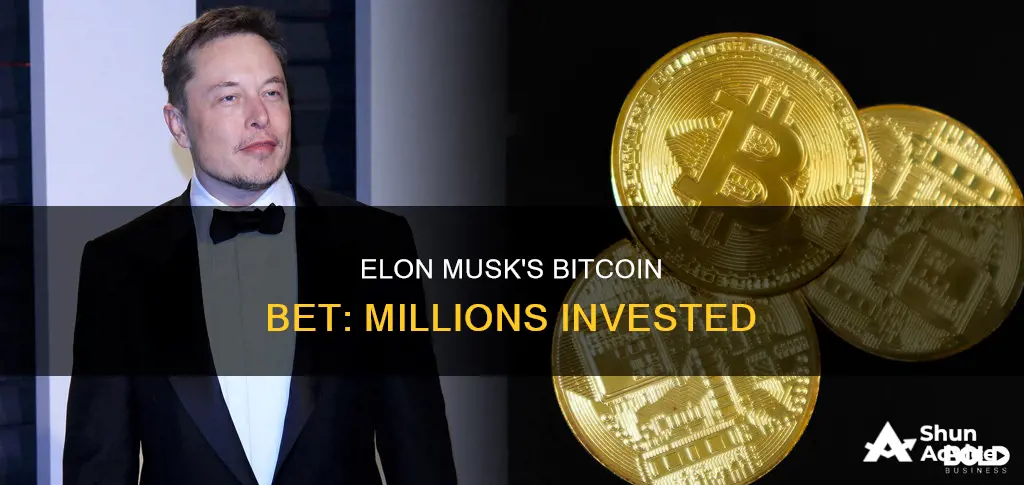
In February 2021, Elon Musk's company Tesla revealed it had purchased $1.5 billion worth of Bitcoin, with Musk confirming that the company would soon start accepting the cryptocurrency as a form of payment for its products. This move by Tesla, led by Musk, was a non-traditional decision as major corporations typically avoid acquiring digital currencies due to concerns about volatility and dependability. The announcement caused Bitcoin's value to soar to an all-time high of over $48,000, and it is estimated that Tesla made roughly $1 billion in profit from its investment.
| Characteristics | Values |
|---|---|
| How much did Elon Musk invest in Bitcoin? | $1.5 billion |
| When did Elon Musk invest in Bitcoin? | January 2021 |
| What is the name of Elon Musk's company? | Tesla |
| Why did Elon Musk invest in Bitcoin? | To diversify and maximise returns on Tesla's cash |
| Did Elon Musk accept Bitcoin as payment for Tesla cars? | Yes |
What You'll Learn

Elon Musk's $1.5 billion bitcoin investment
In February 2021, Elon Musk's electric vehicle company Tesla revealed that it had purchased $1.5 billion worth of Bitcoin. The news came as a surprise to many, as it is uncommon for major corporations to invest in digital currencies due to their volatility and questions about their dependability.
The investment was made as part of a policy change by Tesla to allow the company to invest in various forms of digital assets and to "further diversify and maximize returns on our cash". The company also announced that it would soon start accepting Bitcoin as a form of payment for its products, including its cars. This move added to the buzz around both the carmaker and the cryptocurrency, pushing Bitcoin to an all-time high of above $48,000.
The decision to invest in Bitcoin was influenced by Musk's view that traditional fiat currency has negative real interest rates, making alternative investments more attractive. In a tweet, Musk stated, "When fiat currency has negative real interest, only a fool wouldn't look elsewhere." Real interest rates are negative when the inflation rate is higher than the nominal interest rate, as was the case at the time of Tesla's Bitcoin investment.
The impact of Musk's decision extended beyond just the price of Bitcoin. As a prominent entrepreneur, his endorsement of Bitcoin sparked a mini-trend, with other companies considering similar moves. However, the volatility of Bitcoin and the regulatory uncertainty surrounding cryptocurrencies continue to be a concern for many businesses.
Tesla's investment in Bitcoin proved to be profitable, with analyst Daniel Ives estimating that the company made approximately $1 billion in paper profits from the investment. This led Ives to predict that Tesla was "on a trajectory to make more from its Bitcoin investments than profits from selling its EV (electric vehicle) cars in all of 2020."
AI Coins: Best Crypto Investments for the Future
You may want to see also

Tesla's bitcoin profits
In early 2021, Tesla invested $1.5 billion in Bitcoin, with CEO Elon Musk touting the cryptocurrency's advantages over standard fiat currency. The company disclosed in a Securities and Exchange Commission (SEC) filing that it had purchased Bitcoin for more flexibility to further diversify and maximize returns on our cash. This move by Tesla fueled a surge of interest in Bitcoin, pushing it to record highs.
At the time of Tesla's investment, Bitcoin traded in the range of about $30,000 to $40,000, and the company's purchase was seen as a validation of the cryptocurrency's potential. Tesla's investment in Bitcoin was part of a broader strategy to embrace digital assets, with the company also announcing that it would soon begin accepting Bitcoin as a form of payment for its products.
Tesla's Bitcoin investment proved to be initially profitable, with analyst estimates suggesting the company made roughly $1 billion in paper profits. This led to suggestions that Tesla was on track to make more from its Bitcoin investments than from selling its electric vehicles (EVs) in all of 2020.
However, the volatile nature of cryptocurrencies also affected Tesla's profitability. In 2022, the company sold 75% of its Bitcoin holdings, citing concerns about overall liquidity and the impact of "Bitcoin impairment" on its financial performance. Despite the sale, Tesla still made a profit of $64 million from certain conversions of Bitcoin into fiat currency, demonstrating the significant gains that can be achieved in the cryptocurrency market.
Overall, Tesla's Bitcoin profits have been substantial, and the company continues to explore opportunities in the digital asset space, with CEO Elon Musk noting that Tesla is open to buying Bitcoin in the future.
IRA Bitcoin Investment: A Secure Retirement Plan
You may want to see also

Bitcoin's value when Tesla invested
On February 8, 2021, Tesla announced in an SEC filing that it had bought $1.5 billion worth of bitcoin. The company also said it would start accepting bitcoin as a payment method for its products, making it the first major automaker to do so.
The price of bitcoin surged to new highs following Tesla's announcement, reaching a price of at least $44,200. The exact price of bitcoin when Tesla invested is unclear, but it is known that bitcoin traded in the range of about $30,000 to $40,000 in January 2021. By the time of Tesla's announcement in early February, the price of bitcoin had risen to around $41,600, and it continued to surge after the news of Tesla's investment broke.
Tesla's move into bitcoin represented a significant investment of its cash on hand, which totalled more than $19 billion in cash and cash equivalents at the end of 2020. The company's investment in bitcoin was part of a policy change designed "to provide us with more flexibility to further diversify and maximize returns on our cash." This policy change allowed Tesla to invest in various forms of digital assets, marking a nontraditional move for a major corporation due to questions about the dependability and volatility of digital currencies.
Tesla's CEO, Elon Musk, has been a proponent of digital currencies and has been credited for raising the prices of cryptocurrencies, including bitcoin, through his messages on Twitter. Musk's tweets about bitcoin and other cryptocurrencies have had a significant impact on their prices, with his positive messages encouraging more people to buy digital currencies. However, it is worth noting that Musk has also recognised the risk of holding cryptocurrencies, as demonstrated by his tweet in December 2020, where he stated that "Bitcoin is almost as bs as fiat money."
The Ultimate Guide to Buying Your First Bitcoin
You may want to see also

Elon Musk's view on bitcoin
In February 2021, Elon Musk's electric vehicle company Tesla disclosed in a Securities and Exchange Commission (SEC) filing that it had bought $1.5 billion worth of bitcoin. The company also said it would soon accept bitcoin as a form of payment for its products.
Musk explained that the decision to buy bitcoin was due to the inability to receive a return on his company's cash. "When fiat currency has negative real interest, only a fool wouldn’t look elsewhere," he tweeted. Real interest rates are negative when the rate of inflation is higher than the nominal interest rate.
Musk has also said that bitcoin is "simply a less dumb form of liquidity than cash". However, he has recognised the risk of holding cryptocurrencies, tweeting in December 2020 that "bitcoin is almost as bs as fiat money".
Tesla's investment in bitcoin has been described as a "daring gambit" by some commentators, and it has not inspired most other major corporations to follow suit. In a survey conducted in February 2021, 95% of respondents said they had no plans to purchase bitcoin that year. However, there is a growing curiosity about bitcoin among corporate leaders, and a small but significant mini-trend towards following Musk's lead.
A Guide to Investing in Litecoin Cryptocurrency
You may want to see also

Bitcoin's volatility
In February 2021, Tesla, led by Elon Musk, revealed that it had purchased about $1.5 billion in bitcoin in January and that it expected to start accepting it as a form of payment in the future. This move by Tesla and Musk added to the buzz around both the carmaker and the cryptocurrency.
Bitcoin is considered a volatile asset. Volatility is a measure of how much the price of a financial asset varies over time. The volatility of Bitcoin is measured by how much its price fluctuates relative to its average price over a period of time. The cryptocurrency industry thrives on speculation, with investors betting that Bitcoin's price will increase or decrease to make a profit. This causes a sudden increase or decrease in Bitcoin's price, leading to volatility.
Despite its volatility, investors have historically been well-compensated for Bitcoin's volatility. Bitcoin has historically exhibited high volatility or high measures of standard deviation, but when examining its returns, many are disproportionately skewed to the positive side. This is evident in Bitcoin's Sharpe ratio of 0.96 from 2020 to early 2024, indicating that investors have been more than compensated for the risk compared to the S&P 500.
Additionally, historically low volatility in Bitcoin has been a precursor to a price increase. Low volatility typically occurs at the end of long bear markets when selling energy is low, and Bitcoin's price begins to increase. This may signal a growing belief that Bitcoin is maturing, further accelerated by the approval of spot Bitcoin exchange-traded products.
In summary, while Bitcoin is considered a volatile asset, its volatility has been declining, and investors have been compensated for the risk. Historically, low volatility has preceded price increases, and Bitcoin's maturing status may contribute to its price discovery and lower volatility over time.
Exploring Bitcoin's Potential Profits with a $5000 Investment
You may want to see also
Frequently asked questions
Elon Musk invested \$1.5 billion in Bitcoin in January 2021.
Elon Musk invested in Bitcoin to diversify his investments and maximize returns on Tesla's cash.
Yes, according to an analyst at Wedbush Securities, Tesla made about \$1 billion in profit from its Bitcoin investment.







